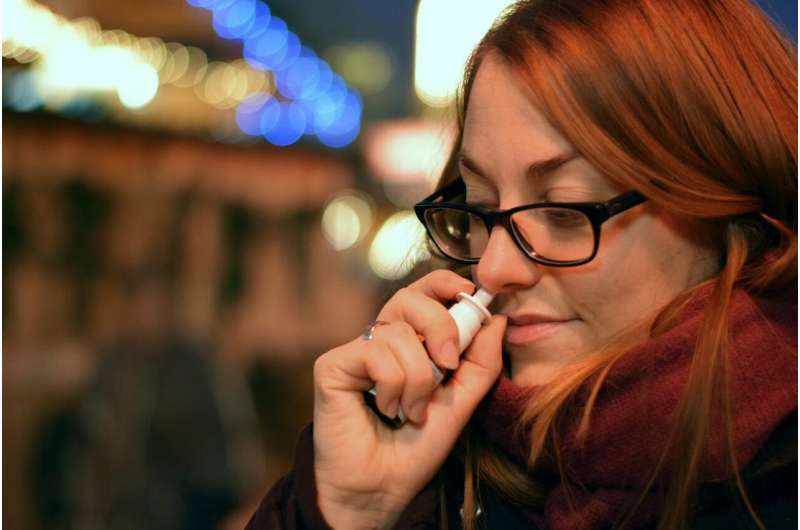This article has been reviewed according to Science X's editorial process and policies. Editors have highlighted the following attributes while ensuring the content's credibility:
fact-checked
peer-reviewed publication
trusted source
proofread
Nasal spray with antibodies could prevent COVID-19

Researchers at Karolinska Institutet have shown that nasal drops with IgA antibodies can protect mice from SARS-CoV-2 infection. The results imply a new way to protect individuals at high risk from different variants of the SARS-CoV-2 virus and possibly other infections. The study is published in PNAS.
Different types of antibodies have different functions in the body. IgA antibodies are part of the so-called adaptive immune system and reside naturally in the mucosal membranes of the airways. Absence or low levels of mucosal IgA is known to be associated with an increased risk of SARS-CoV-2 breakthrough infections.
The current COVID-19 vaccines mainly stimulate an IgG antibody response in the body, and earlier studies have shown that their ability to protect against infection with the new omicron variants of the virus is limited.
To overcome this, the group led by professor Qiang Pan-Hammarström at Karolinska Institutet used genetic engineering to create IgA antibodies that bind to the SARS-CoV-2 spike protein in a similar way to the IgG antibodies.
Neutralizes the virus effectively
Mice infected with the omicron variant received the IgA antibody treatment through nasal administration. The nasal drops significantly diminished the virus load in the trachea and lungs of the infected mice. The IgA antibodies were shown to bind stronger to the spike protein of SARS-CoV-2 and were more effective in neutralizing the virus compared to the original IgG antibodies.
"The results show that these genetically engineered antibodies can strengthen the protection against new virus variants, but they are not intended to replace current vaccines," says Harold Marcotte, associate professor at the Department of Medical Biochemistry and Biophysics, Karolinska Institutet, and the first author of the paper.
"Traditional vaccines elicit an active immune response from the body, whereas this is a passive immunization strategy," he continues. "An active immunization approach that induces a mucosal immune response would be ideal, but hopefully our approach is suitable for protecting the most vulnerable individuals, like the elderly or immunocompromised persons."
Promising strategy for other infections
There are also hopes that the method can be used to neutralize other current and emerging variants of the virus.
"We believe that this will be a very promising strategy, not only for COVID-19 and the new variants, but also for other infectious diseases, including influenza and other respiratory infections and gastric mucosal infections such as Helicobacter pylori, where there is no vaccine available at the moment," says Qiang Pan-Hammarström, professor at the same department and last author of the paper.
More information: Harold Marcotte et al, Conversion of monoclonal IgG to dimeric and secretory IgA restores neutralizing ability and prevents infection of Omicron lineages, Proceedings of the National Academy of Sciences (2024). DOI: 10.1073/pnas.2315354120




















